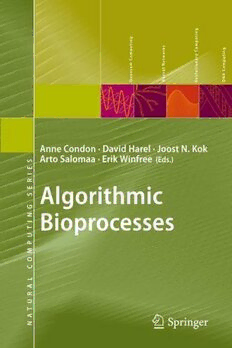
Algorithmic bioprocesses PDF
762 Pages·2009·13.145 MB·English
Most books are stored in the elastic cloud where traffic is expensive. For this reason, we have a limit on daily download.
Preview Algorithmic bioprocesses
Description:
A fundamental understanding of algorithmic bioprocesses is key to learning how information processing occurs in nature at the cell level. The field is concerned with the interactions between computer science on the one hand and biology, chemistry, and DNA-oriented nanoscience on the other. In particular, this book offers a comprehensive overview of research into algorithmic self-assembly, RNA folding, the algorithmic foundations for biochemical reactions, and the algorithmic nature of developmental processes.The editors of the book invited 36 chapters, written by the leading researchers in this area, and their contributions include detailed tutorials on the main topics, surveys of the state of the art in research, experimental results, and discussions of specific research goals. The main subjects addressed are sequence discovery, generation, and analysis; nanoconstructions and self-assembly; membrane computing; formal models and analysis; process calculi and automata; biochemical reactions; and other topics from natural computing, including molecular evolution, regulation of gene expression, light-based computing, cellular automata, realistic modelling of biological systems, and evolutionary computing. This subject is inherently interdisciplinary, and this book will be of value to researchers in computer science and biology who study the impact of the exciting mutual interaction between our understanding of bioprocesses and our understanding of computation.
See more
The list of books you might like
Most books are stored in the elastic cloud where traffic is expensive. For this reason, we have a limit on daily download.
